Table of Contents
- What Is a Workshop Evaluation Questionnaire?
- 7+ Workshop Evaluation Questionnaire Templates in MS Word | PDF
- 1. Workshop Evaluation Questionnaire Template
- 2. Sample Workshop Evaluation Questionnaire
- 3. Formal Workshop Evaluation Questionnaire
- 4. Workshop Evaluation Questionnaire Example
- 5. Printable Workshop Evaluation Questionnaire
- 6. Simple Workshop Evaluation Questionnaire
- 7. Workshop Evaluation Questionnaire Format
- 8. Basic Workshop Evaluation Questionnaire
- How to Make a Workshop Evaluation Questionnaire
- What is a questionnaire?
- Who invented the questionnaire?
- What’s the significance of a workshop?
- What’s the difference between a conference, a seminar, and a workshop?
7+ Workshop Evaluation Questionnaire Templates in MS Word | PDF
Who, again, is the best teacher of all time? Right, that’s experience. Oftentimes, when we sit in a cozy room while listening intently to an important discussion, all we have at the end of the day are several pages of scribbles with little to no inkling of how these theories may become useful in the field. A workshop provides both the opportunity to learn and apply the concepts presented through pre-planned training activities and interactive sessions. This gives the participants a glimpse of the task’s weight and the actual process of the job. To improve the quality of their programs, organizers gather feedback through workshop evaluation questionnaires to hear the participant’s take of the experience. Read on and learn more about it.

What Is a Workshop Evaluation Questionnaire?
Medium sees workshops as a valuable learning opportunity. It offers everything symposiums, conferences, and seminars have except one—the bond. Also, it builds connections through interactions and real-time application of the event’s agenda. You learn not only from what was discussed but also from the people around you who share the same interests with you. For the organizers to create such a gratifying experience, it needs to hear the attendees’ assessment of their work.
A workshop evaluation questionnaire is a helpful tool to meet that purpose. It is a set of questions that aims to gauge the participants’ satisfaction with the different aspects of a recent workshop. It gathers data to determine whether or not the event was able to perform its purpose efficiently, if there’s a need for improvement, or if there are gaps that need to be filled. This helps workshop organizers create better programs and address grievances and issues that they may have overlooked.
7+ Workshop Evaluation Questionnaire Templates in MS Word | PDF
1. Workshop Evaluation Questionnaire Template
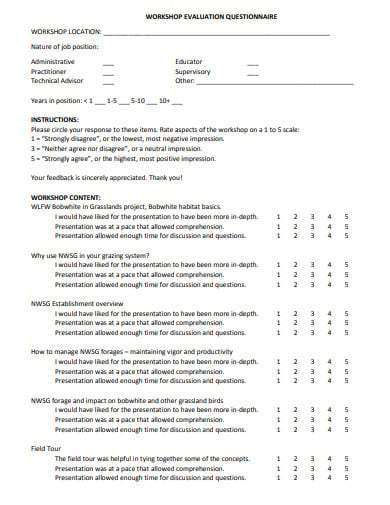 bringbackbobwhites.org
bringbackbobwhites.org2. Sample Workshop Evaluation Questionnaire
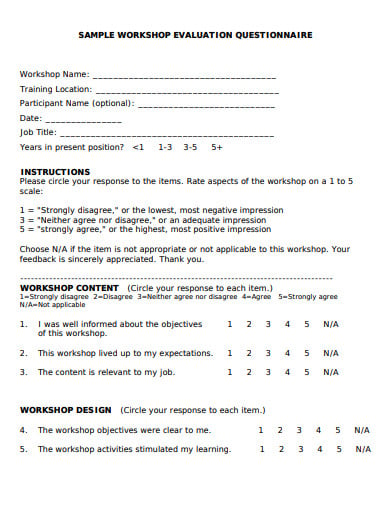 enhancinged.wgbh.org
enhancinged.wgbh.org3. Formal Workshop Evaluation Questionnaire
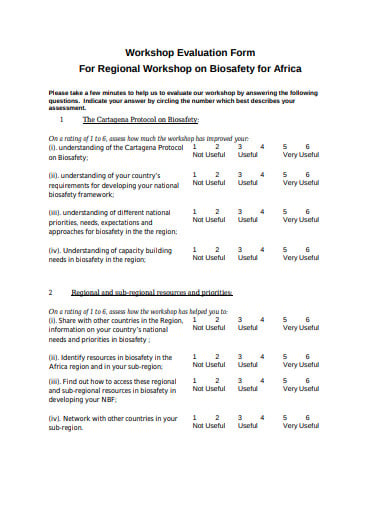 unep.ch
unep.ch4. Workshop Evaluation Questionnaire Example
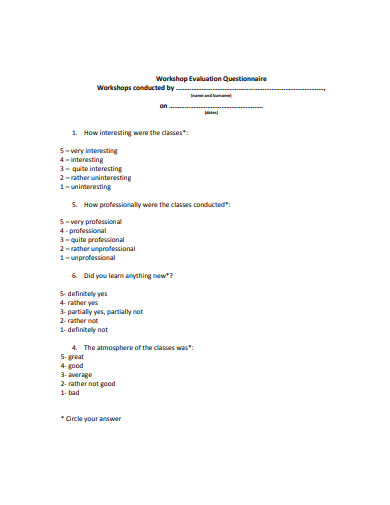 sbait.eu
sbait.eu5. Printable Workshop Evaluation Questionnaire
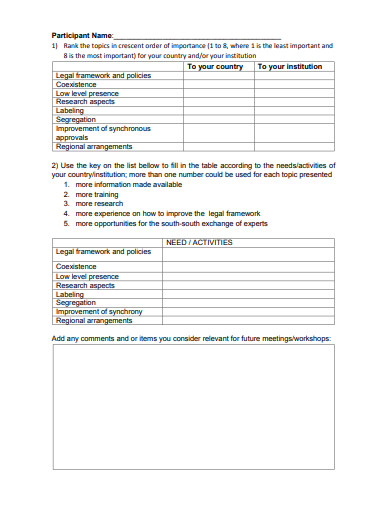 cnpma.embrapa.br
cnpma.embrapa.br6. Simple Workshop Evaluation Questionnaire
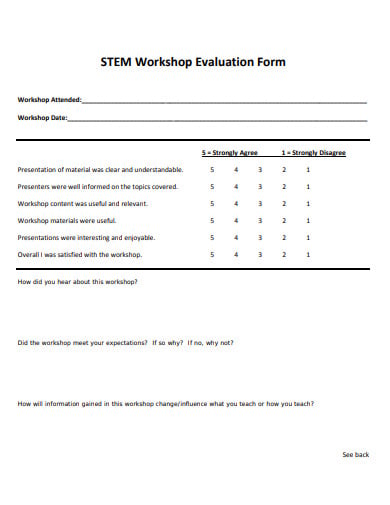 usi.edu
usi.edu7. Workshop Evaluation Questionnaire Format
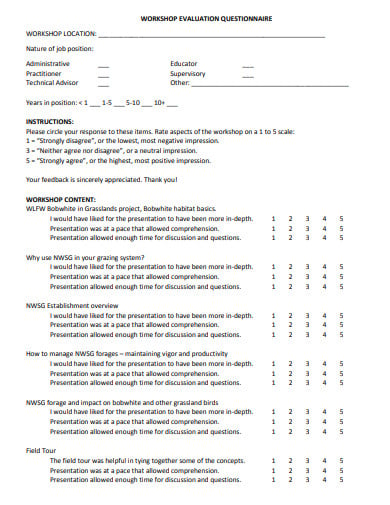 bringbackbobwhites.org
bringbackbobwhites.org8. Basic Workshop Evaluation Questionnaire
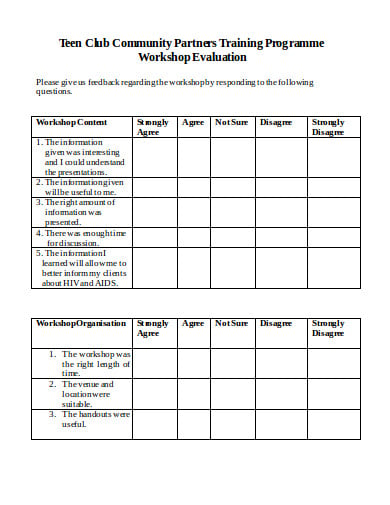 botswanateenclub.files.wordpress.com
botswanateenclub.files.wordpress.comHow to Make a Workshop Evaluation Questionnaire
Below are some ways on how you can make better assessment questionnaires to evaluate your participant’s workshop experience:
1. Include an Introduction
Your respondents must know firsthand what the questionnaire is all about and its significance. Handing down the document without so much of an explanation why they need to answer it will prompt them to ask more. Without this, they may decline the approach. Write a brief introduction to the questionnaire’s general description and how it will be used. Also, state that their answers will help you organize better and more improved workshops in the future. The latter will put the respondents at ease, knowing that their answers are intended for a noble cause.
2. Ask Questions That Answers Your Goal
It’s important that every question on your evaluation points toward a common goal—your questionnaire’s purpose. Craft items that will answer your focus for making the document in the first place. If you want to assess the efficiency of your workshop’s lesson tool, you could make a module evaluation. This should contain questions that center around the module you are using during the said event. If you want to gauge their overall experience, an event satisfaction survey would be the right fit. Customize your questionnaire according to your focus.
3. Choose the Right Blend of Questions
Generally, there are two forms of questions: open-ended and closed-ended questions. A questionnaire’s majority consists of close-ended questions such as dichotomous questions (e.g., yes-no questions) and multiple choices (e.g., Likert scale and checklists). They are ideal because they’re brief, easier to answer, and demand little time from your respondents. The open-ended questions should be used sparingly and are usually placed at the very end of the questionnaire. Identify which types of questions will help you achieve your goal. However, use only one or two combinations of these questions to avoid confusing your audience.
4. Split Into Categories
You don’t want to intimidate your respondents with a full and lengthy questionnaire copy. One look at a three-page document, and they’ll possibly squirm out of your way. Strive to make your questionnaire as concise as possible. However, if you need to have several questions answered, categorize them into different topics. A long list of items without a break may make the respondents like they’re answering a long exam. Splitting them into different sections will make it less of a burden and make it seem more manageable instead.
What is a questionnaire?
A questionnaire is a set of questions that are often referred to as an instrument in research to gather data from respondents to bring light to a study’s focus.
Who invented the questionnaire?
Sir Francis Galton, an explorer, geographer, anthropologist, eugenicist, and meteorologist, is the inventor of questionnaires. In 1870, he asked renowned scientists to answer his questionnaire, which became the basis for his book, The English Men of Science.
What’s the significance of a workshop?
A workshop’s significance is allowing the learning of a new concept or a relevant topic by encouraging its participants to get involved through actual performance of what has been presented.
What’s the difference between a conference, a seminar, and a workshop?
A conference is a formal meeting of different people who come together to discuss a particular topic. On the other hand, a seminar is academic in nature, as it aims to teach people about an agenda by inviting an expert on the subject. A workshop differs from the two in a way that involves a practical activity.
Workshops effectively merge the virtue of listening and the value of doing in a single venue. It walks the talk and encourages people to do the same. This method contributes to a higher retention rate of the participants, raising the chances of them adopting the technique or the skill they have learned throughout the sessions. But this level of success is unattainable without a few refining strokes from the previously held workshops. Evaluation is a valuable process in shaping anything into a better version of what it had been.

